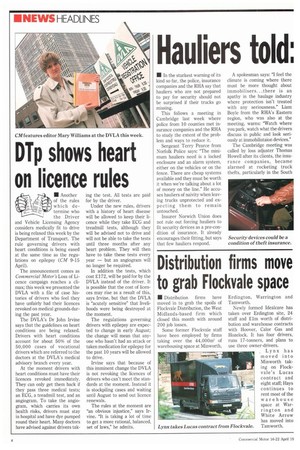Dip shows heart on licence rules
Page 6

If you've noticed an error in this article please click here to report it so we can fix it.
• Another of the rules which de e-termine who
the Driver and Vehicle Licensing Agency considers medically fit to drive is being relaxed this week by the Department of Transport. The rule governing drivers with heart conditions is being eased at the same time as the regulations on epilepsy (CM 9-15 April).
The announcement comes as Commercial Motor's Loss of Licence campaign reaches a climax; this week we presented the DVLA with a file of case histories of drivers who feel they have unfairly had their licences revoked on medical grounds during the past year.
The DVLA's Dr John Irvine says that the guidelines on heart conditions are being relaxed. Drivers with heart conditions account for about 50% of the 50,000 cases of vocational drivers which are referred to the doctors at the DVLA's medical advisory branch every year.
At the moment drivers with heart conditions must have their licences revoked immediately, They can only get them back if they pass three medical tests; an ECG, a treadmill test, and an angiogram. To take the angiogram, which carries its own health risks, drivers must stay in hospital and have dye pumped round their heart. Many doctors have advised against drivers tak ing the test. All tests are paid for by the driver.
Under the new rules, drivers with a history of heart disease will be allowed to keep their licence while they take ECG and treadmill tests, although they will be advised not to drive and will not be able to take the tests until three months after any heart problem. They will then have to take these tests every year — but an angiogram will no longer be required.
In addition the tests, which cost £172, will he paid for by the DVLA instead of the driver. It is possible that the cost of licences may rise as a result of this, says Irvine, but that the DVLA is "acutely sensitive" that livelihoods were being destroyed at the moment.
The regulations governing drivers with epilepsy are expected to change in early August; the change will mean that anyone who hasn't had an attack or taken medication for epilepsy for the past 10 years will be allowed to drive.
Irvine says that because of this imminent change the DVLA is not revoking the licences of drivers who can't meet the standards at the moment. Instead it is stockpiling cases and waiting until August to send out licence renewals.
The rules at the moment are "an obvious injustice," says Irvine. "It is taking a lot of time to get a more rational, balanced, set of laws," he admits.




































































































